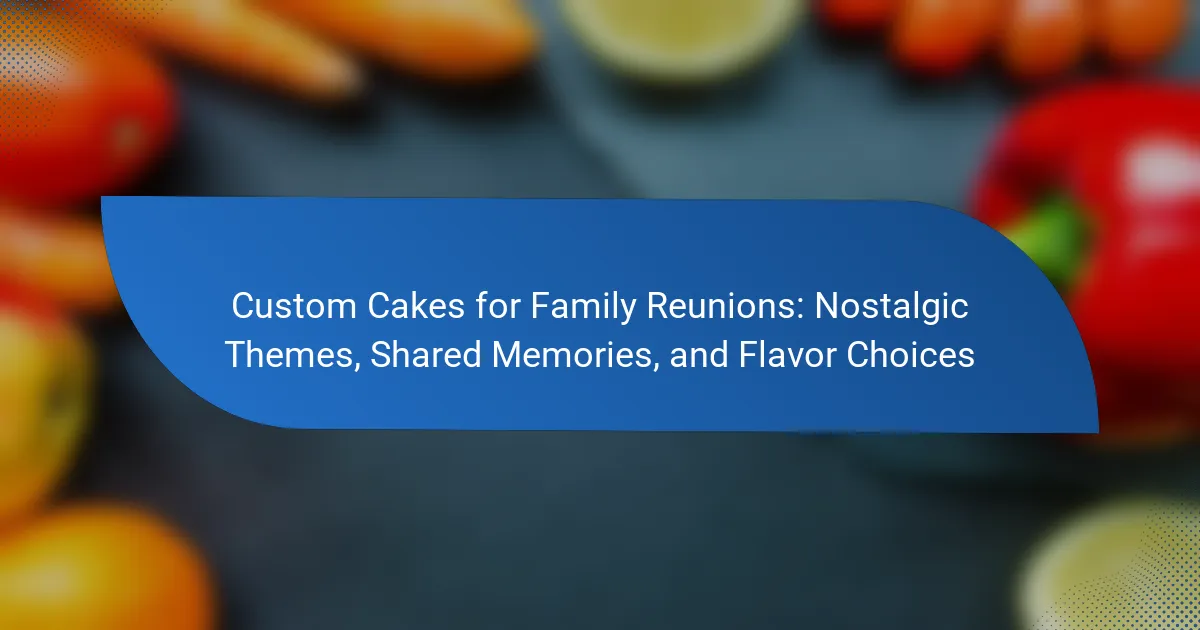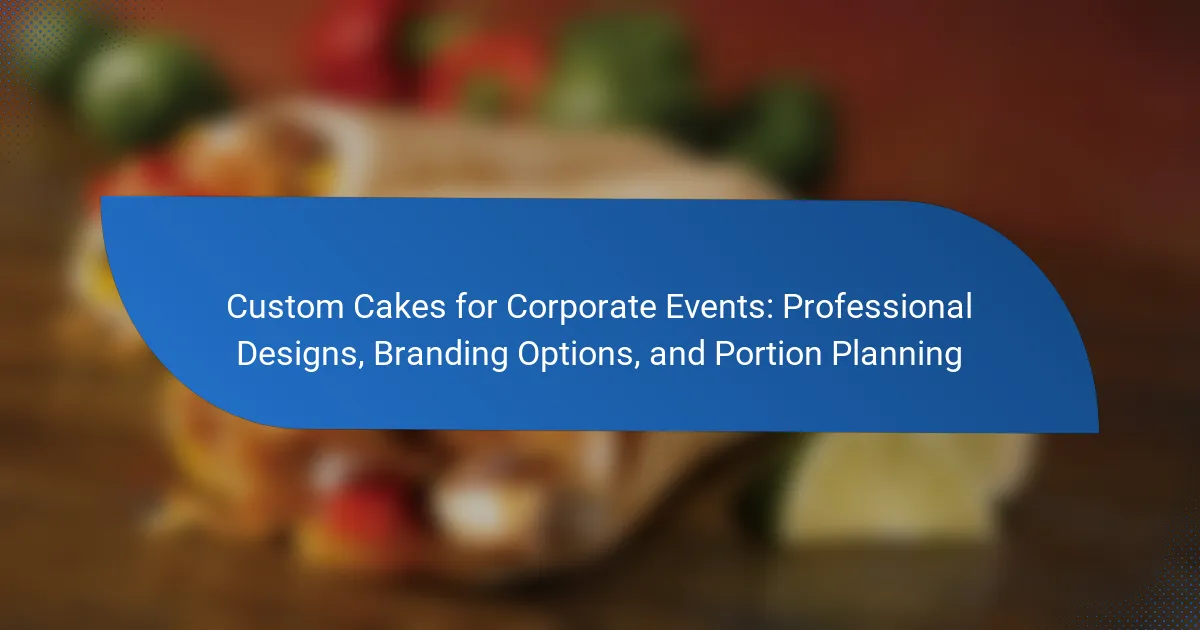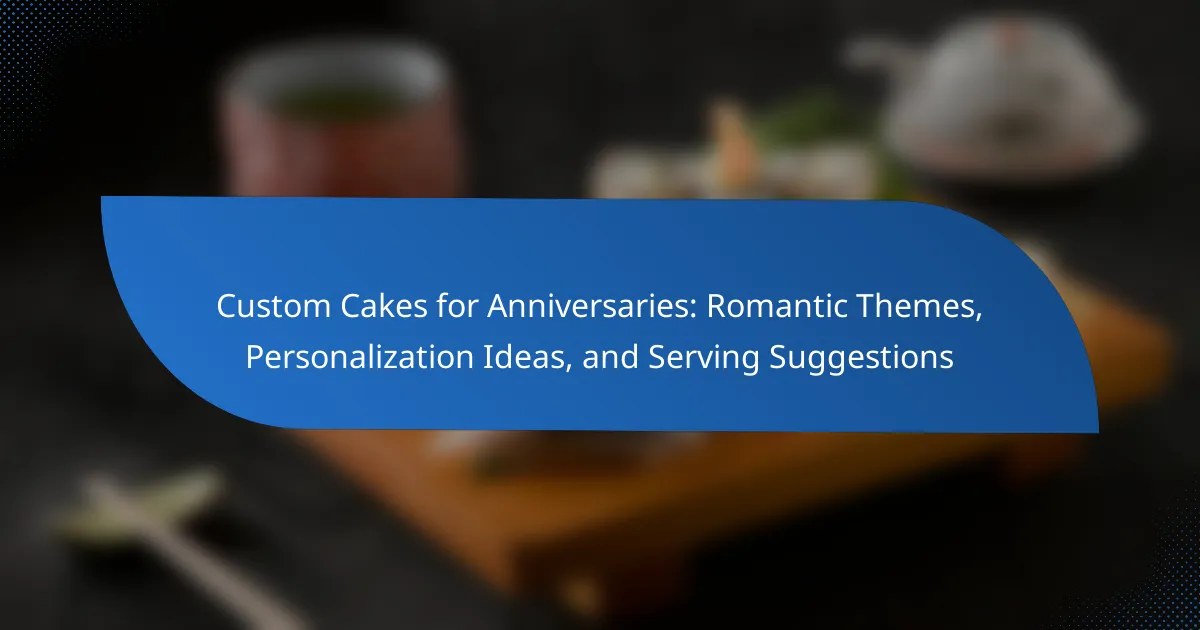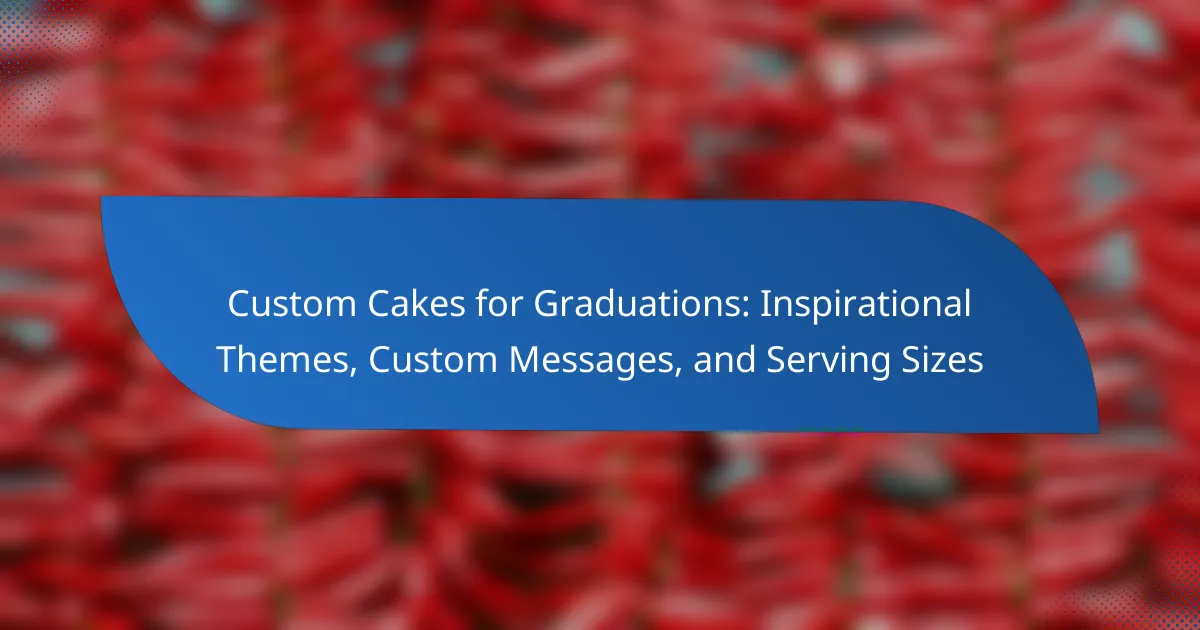Custom cakes for weddings are uniquely designed desserts that reflect the couple’s preferences, wedding theme, and personal style. These cakes come in various shapes, sizes, and flavors, often featuring intricate decorations like fondant, edible flowers, and personalized toppers. The article covers the design process, including consultations with bakers, flavor pairings that enhance taste and texture, and important considerations such as cake size, flavor selection, design alignment with wedding aesthetics, dietary restrictions, budget, and ordering timelines. It highlights the growing popularity of custom cakes and their role in making weddings memorable for both couples and their guests.
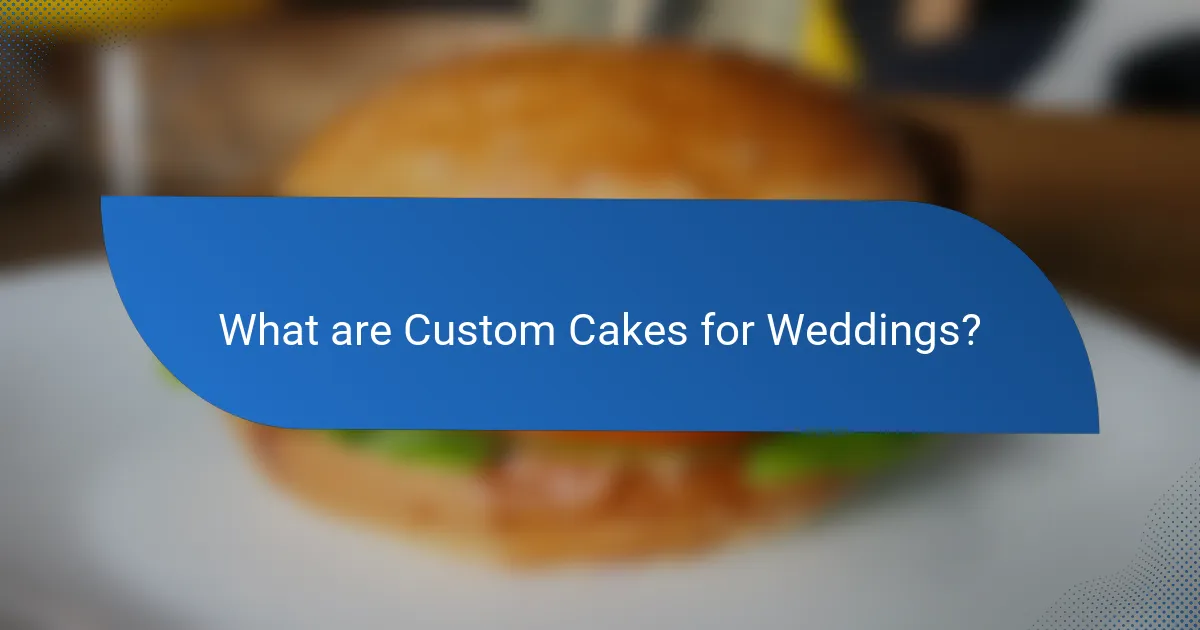
What are Custom Cakes for Weddings?
Custom cakes for weddings are uniquely designed cakes tailored to the couple’s preferences. These cakes often reflect the wedding theme and personal style. They can come in various shapes, sizes, and flavors. Custom cakes typically feature intricate decorations, such as fondant, edible flowers, or personalized cake toppers. The design process involves consultation with a baker to ensure the cake meets specific requirements. Customization allows for a distinctive dessert that stands out during the celebration. Many couples choose these cakes to enhance the overall aesthetic of their wedding. The popularity of custom cakes has grown, with many bakeries specializing in this service.
How do Custom Cakes differ from standard wedding cakes?
Custom cakes are uniquely designed to reflect individual preferences, while standard wedding cakes follow traditional styles. Custom cakes allow for personalized flavors, colors, and decorations. Standard wedding cakes typically have classic flavors like vanilla or chocolate. Custom cakes can incorporate unique ingredients and flavor combinations. The design of custom cakes can be tailored to match wedding themes. Standard wedding cakes often use conventional tiered structures. Custom cakes can feature intricate designs or unconventional shapes. This flexibility in design and flavor makes custom cakes distinct from standard wedding cakes.
What unique attributes define Custom Cakes for Weddings?
Custom cakes for weddings are defined by their personalized designs, intricate decorations, and unique flavor combinations. Each cake is tailored to reflect the couple’s style and wedding theme. Customization includes specific colors, shapes, and motifs that resonate with the couple’s story. Tiered structures are common, allowing for both aesthetic appeal and serving larger groups. Unique flavor pairings enhance the cake experience, often combining traditional and modern tastes. These cakes frequently incorporate special ingredients, such as organic or locally sourced elements. The artistry involved in creating custom cakes sets them apart from standard options. Each cake is a reflection of individual preferences, making it a memorable centerpiece for the celebration.
Why are Custom Cakes important for wedding celebrations?
Custom cakes are important for wedding celebrations because they serve as a centerpiece that reflects the couple’s personality and theme. They symbolize the union of two individuals and are often a focal point during the reception. Custom cakes can be designed to match the wedding colors, style, and overall aesthetic. This personalization enhances the visual appeal of the event. Additionally, unique flavors and designs can cater to the couple’s tastes and preferences. According to a survey by The Knot, 78% of couples prioritize a custom cake as part of their wedding planning. This statistic underscores the significance of custom cakes in creating memorable experiences for guests.
What styles are available for Custom Wedding Cakes?
Custom wedding cakes are available in various styles. Popular styles include classic, modern, rustic, and vintage. Classic styles often feature elegant designs with smooth fondant and intricate piping. Modern styles embrace geometric shapes and bold colors. Rustic styles showcase a more natural look, often with textured buttercream and floral accents. Vintage styles draw inspiration from past eras, incorporating lace and antique details. Each style can be customized with unique flavors and decorations to match the couple’s theme.
How do Elegant Styles enhance the wedding theme?
Elegant styles enhance the wedding theme by creating a sophisticated and cohesive aesthetic. These styles contribute to the overall ambiance of the event. Elegant designs often feature intricate details and refined color palettes. They elevate the visual appeal of wedding cakes, making them focal points. For instance, tiered structures in elegant styles add height and grandeur. Additionally, the use of luxurious materials like fondant and edible gold enhances the cake’s elegance. This aligns with the wedding’s theme, making the celebration feel more special. Overall, elegant styles transform ordinary cakes into exquisite works of art that reflect the couple’s taste.
What are the most popular Elegant Styles for Custom Cakes?
The most popular elegant styles for custom cakes include fondant-covered cakes, buttercream frosting designs, and [censured] cakes. Fondant-covered cakes provide a smooth, polished finish that allows for intricate detailing. This style is often used for formal events like weddings. Buttercream frosting designs offer a softer look with various textures and colors. They can be piped into beautiful floral patterns or smooth finishes. [censured] cakes, which feature exposed layers, are trendy for a rustic yet elegant appearance. Each style can be customized with unique flavors and decorations to suit the occasion.
What are the common structures of Custom Wedding Cakes?
Common structures of custom wedding cakes include tiered designs, single-layer cakes, and shaped cakes. Tiered cakes typically consist of multiple stacked layers, often ranging from two to five tiers. These tiers can vary in size and shape, allowing for intricate designs. Single-layer cakes are simpler and often used for smaller weddings or as a base for a larger display. Shaped cakes are molded into specific designs, such as hearts or floral motifs, to reflect the couple’s theme. Each structure can be customized with various flavors, fillings, and decorations.
How do tiered structures contribute to the cake’s visual appeal?
Tiered structures enhance a cake’s visual appeal by creating height and dimension. This design draws the eye upward, making the cake more striking. Each tier can showcase different decorations and colors. This variety adds interest and can reflect the wedding theme. Additionally, tiered cakes can be adorned with flowers or intricate designs that stand out. The layers also allow for creative flavor pairings, making the cake not only visually appealing but also enticing to taste. Overall, tiered structures contribute significantly to the cake’s overall aesthetic and presentation.
What are the different tiered designs available for Custom Cakes?
Different tiered designs available for custom cakes include classic, square, and hexagonal shapes. Classic tiered cakes typically feature round layers stacked vertically. Square tiered designs provide a modern aesthetic with sharp angles. Hexagonal cakes offer a unique geometric look. Each design can be customized in height and number of tiers. Popular configurations include two, three, or more tiers. These designs can also incorporate various flavors and fillings. Custom decorations enhance the visual appeal of each tiered cake.
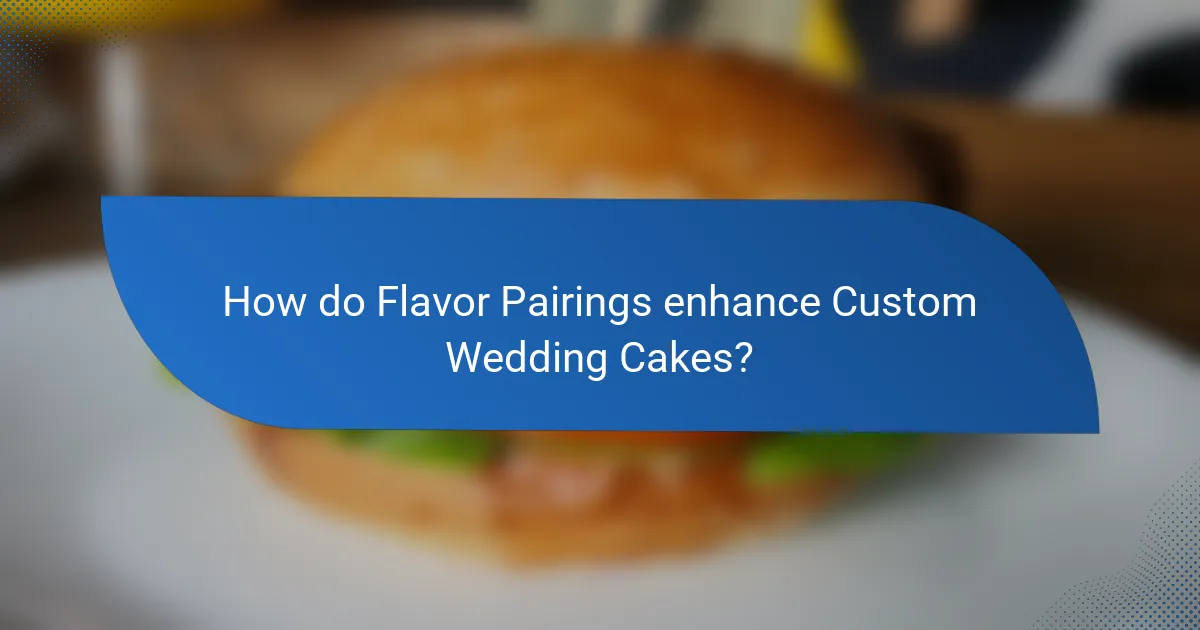
How do Flavor Pairings enhance Custom Wedding Cakes?
Flavor pairings enhance custom wedding cakes by creating a harmonious balance of taste. They allow for unique combinations that cater to diverse palates. For example, pairing chocolate with raspberry adds richness and tartness. Complementary flavors can elevate the overall cake experience. This enhances not just flavor but also aroma and texture. Studies show that well-paired flavors can increase enjoyment and satisfaction during tastings. Customization through flavor pairings can reflect the couple’s personality and preferences. This personal touch makes the wedding cake memorable for guests.
What are the most popular flavor combinations for Custom Cakes?
The most popular flavor combinations for custom cakes include vanilla and chocolate, red velvet with cream cheese, and lemon with raspberry. Vanilla and chocolate create a classic pairing enjoyed by many. Red velvet is often complemented by tangy cream cheese frosting. Lemon and raspberry provide a refreshing contrast, appealing to those who prefer fruity flavors. Other popular combinations are almond with buttercream and coconut with pineapple. These combinations cater to a variety of taste preferences, making them favorites for weddings and celebrations.
How do flavor pairings affect the overall experience of the cake?
Flavor pairings significantly enhance the overall experience of the cake. They create a harmonious balance that appeals to the palate. For example, pairing chocolate with raspberry adds depth and complexity. This combination balances sweetness with tartness, elevating the flavor profile. Additionally, complementary flavors can enhance the cake’s aroma and texture. A vanilla cake with lemon zest provides freshness and brightness. Research shows that well-thought-out flavor combinations can improve guest satisfaction. A study published in the “Journal of Culinary Science & Technology” found that flavor pairing influences perceived taste enjoyment. Ultimately, effective flavor pairings contribute to a memorable cake experience at weddings.
What factors should be considered when choosing flavors for a wedding cake?
When choosing flavors for a wedding cake, consider guest preferences, seasonal ingredients, and cake design compatibility. Guest preferences are crucial as they ensure satisfaction. Popular flavors like vanilla, chocolate, and red velvet often appeal to a wide audience. Seasonal ingredients enhance freshness and flavor. For instance, lemon and berry flavors are ideal for summer weddings. Cake design compatibility involves selecting flavors that complement the overall aesthetic and theme. For example, a floral-themed cake may pair well with lavender or rose flavors. Additionally, dietary restrictions should be considered. Gluten-free or vegan options may be necessary for some guests. Finally, tasting sessions can help finalize flavor choices. This process allows couples to experience combinations firsthand.
How can couples personalize their Custom Wedding Cakes?
Couples can personalize their custom wedding cakes by selecting unique flavors, colors, and designs. They can choose flavors that reflect their tastes, such as chocolate, vanilla, or red velvet. Couples may also incorporate their wedding colors into the cake’s frosting and decorations. Custom cake toppers can represent the couple’s interests or shared experiences. Additionally, couples can include personal messages or quotes on the cake for a personal touch. Some may opt for themed designs that reflect their hobbies or wedding theme. Incorporating family recipes can add sentimental value to the cake. Finally, couples can choose specific shapes and tiers to match their wedding style.
What role do themes and colors play in personalization?
Themes and colors are essential in personalizing custom wedding cakes. They reflect the couple’s style and the wedding’s overall aesthetic. Selecting a theme can guide cake design, influencing shapes, decorations, and flavors. Colors can evoke emotions and set the mood for the celebration. For instance, soft pastels may convey romance, while bold colors can create a festive atmosphere. The alignment of cake themes and colors with wedding decor enhances visual harmony. This practice fosters a cohesive experience for guests, making the event memorable. Research shows that color psychology significantly impacts perceptions and feelings, reinforcing the importance of thoughtful color choices in personalization.
How can unique attributes of the couple influence cake design?
Unique attributes of the couple can significantly influence cake design. Personal interests, such as hobbies or travel experiences, can inspire cake themes and decorations. For example, a couple who loves the beach may choose ocean-themed elements. Cultural backgrounds can also dictate flavors and designs, reflecting traditional wedding customs. Additionally, the couple’s color preferences can guide the choice of frosting and decorations. Their shared story can be represented through custom cake toppers or unique shapes. The overall wedding theme will further impact the cake’s style, ensuring cohesion with other elements. Each of these unique attributes contributes to a personalized cake that resonates with the couple’s identity and love story.
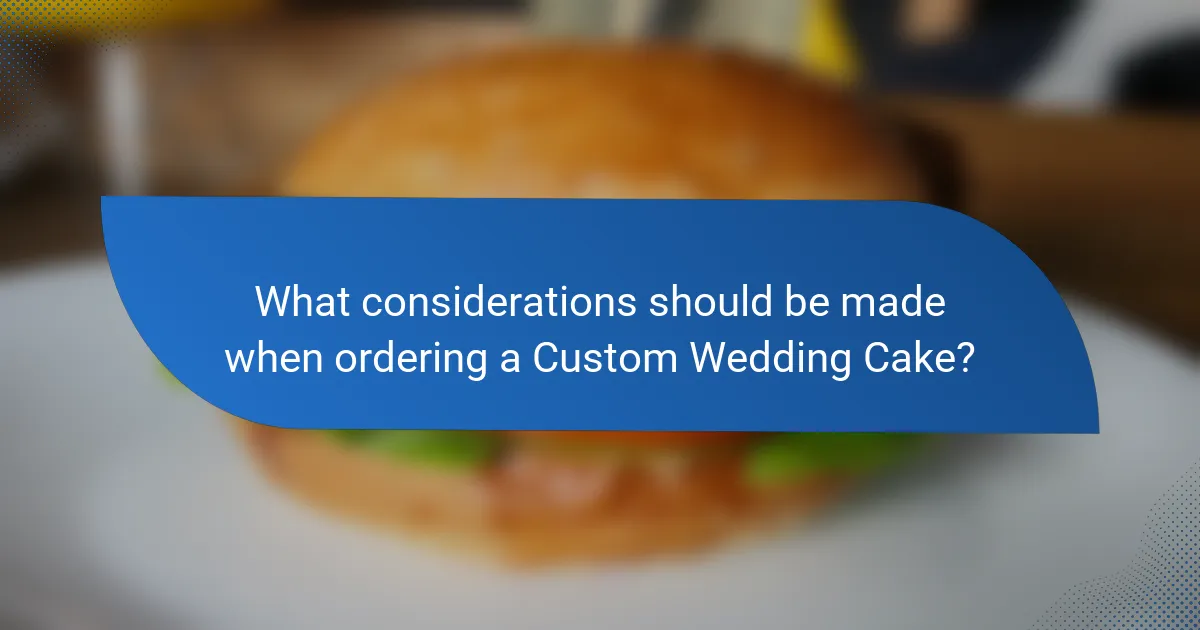
What considerations should be made when ordering a Custom Wedding Cake?
When ordering a custom wedding cake, several key considerations must be made. First, identify the cake size based on the number of guests. A common guideline is to allocate one slice per guest. Next, choose the cake flavor and filling, as these will significantly impact taste. Popular flavors include vanilla, chocolate, and red velvet.
Design is another critical factor. Consider the wedding theme and colors to ensure the cake complements the overall decor. Discuss dietary restrictions with your baker, including options for gluten-free or vegan cakes.
Budget is also essential. Custom cakes can vary widely in price, so establish a budget early on. Lastly, timeline matters; order the cake well in advance, typically 4 to 6 weeks before the wedding, to ensure availability and proper preparation.
How do budget and size impact the choice of Custom Cake?
Budget and size significantly influence the choice of custom cake. A higher budget allows for more intricate designs and premium ingredients. Larger cakes typically require more resources, impacting overall cost. For example, a three-tier cake often costs more than a single-tier cake due to increased labor and materials. Additionally, the number of guests affects size; more guests necessitate a larger cake. Customization options also vary with budget; limited budgets may restrict flavor options or design complexity. Thus, budget and size directly shape the design, flavor, and overall presentation of a custom cake.
What are the cost factors associated with Custom Wedding Cakes?
The cost factors associated with custom wedding cakes include ingredients, design complexity, size, and labor. High-quality ingredients, such as organic or specialty items, increase costs. The complexity of the design, including intricate decorations, affects pricing. Larger cakes require more materials and time, raising expenses. Labor costs vary based on the skill level of the baker. Additional factors include delivery fees and any special requests, such as gluten-free or vegan options. According to industry reports, custom wedding cakes can range from $3 to $15 per slice, depending on these factors.
How can couples ensure they order the right size for their guest list?
Couples can ensure they order the right size for their guest list by accurately estimating the number of attendees. They should create a preliminary guest list and categorize invitees into must-haves and optional guests. Couples can also consider RSVPs to gauge attendance. It is advisable to account for a 10-15% buffer for last-minute additions. Additionally, they can consult with their cake vendor, who can provide guidance based on guest count and cake serving sizes. Accurate guest count is essential for cake sizing, as a typical wedding cake serves about 1 slice per guest.
What tips can help in selecting the perfect Custom Wedding Cake?
To select the perfect custom wedding cake, consider your wedding theme and colors. This ensures the cake complements the overall aesthetic. Next, choose flavors that appeal to you and your partner. Popular choices include vanilla, chocolate, and red velvet. Schedule tastings with potential bakers to experience their offerings firsthand. Review the baker’s portfolio for previous designs and styles. Discuss dietary restrictions with the baker to accommodate all guests. Set a budget early to guide your choices without overspending. Lastly, confirm the delivery and setup details to avoid last-minute issues.
How can couples effectively communicate their vision to the baker?
Couples can effectively communicate their vision to the baker by providing clear and detailed information. They should describe their desired cake style, such as elegant, rustic, or modern. Couples can share specific colors and themes that match their wedding decor. They should also mention any preferred flavors or dietary restrictions. Visual aids, like pictures or sketches, can help convey their ideas more effectively. Open dialogue is crucial; couples should ask questions and encourage feedback from the baker. This collaborative approach ensures that the final cake aligns with their vision. Research indicates that effective communication increases satisfaction in custom orders.
What are some common mistakes to avoid when ordering a Custom Cake?
Common mistakes to avoid when ordering a custom cake include not providing clear specifications. Customers often fail to communicate their desired flavor, size, and design. This can lead to misinterpretations and unsatisfactory results. Another mistake is underestimating the time needed for cake preparation. Custom cakes typically require advance notice, often one to two weeks. Additionally, neglecting to discuss dietary restrictions can result in issues for guests. Lastly, many customers overlook the importance of a budget, which can lead to unexpected costs. These mistakes can significantly impact the overall cake experience.
Custom cakes for weddings are uniquely designed desserts that reflect the couple’s preferences, wedding theme, and personal style. The article explores the differences between custom and standard wedding cakes, emphasizing the personalization in flavors, designs, and structures. It highlights popular elegant styles, tiered structures, and unique flavor pairings that enhance the overall cake experience. Additionally, the article discusses key considerations for ordering a custom wedding cake, including budget, size, and effective communication with bakers to ensure a memorable centerpiece for the celebration.
